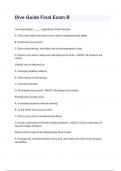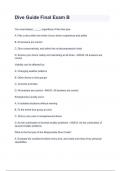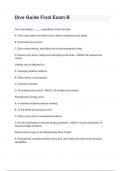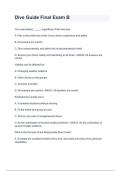Dive guide final exam b - Study guides, Class notes & Summaries
Looking for the best study guides, study notes and summaries about Dive guide final exam b? On this page you'll find 58 study documents about Dive guide final exam b.
Page 4 out of 58 results
Sort by
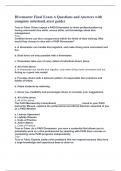
-
Divemaster Final Exam A Questions and Answers with complete solution(Latest guide)
- Exam (elaborations) • 23 pages • 2024
-
- $15.49
- + learn more
Divemaster Final Exam A Questions and Answers with complete solution(Latest guide) True or False. Divers expect a PADI Divemaster to show professionalism by having role-model dive skills, rescue skills, and knowledge about dive management. True. Certified divers can dive unsupervised within the limits of their training. Why would they choose to dive with a PADI Divemaster? a. A divemaster can handle dive logistics, and make diving more convenient and fun. b. Boat dives are only possib...
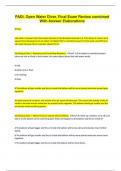
-
PADI, Open Water Diver, Final Exam Review combined With Answer Elaborations
- Exam (elaborations) • 27 pages • 2023
-
- $19.49
- + learn more
PADI, Open Water Diver, Final Exam Review combined With Answer Elaborations D float. Salt water is heavier than fresh water because it has dissolved minerals in it. This means it causes more upward force (buoyancy) on an object. An object that is neutrally buoyant in fresh water would float in salt water because there is greater upward force. See Being a Diver I - Buoyancy and Controlling Buoyancy. Ans 1) If an object is neutrally buoyant (does not sink or float) in fresh water, the same ...
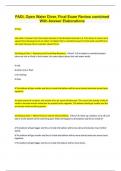
-
PADI, Open Water Diver, Final Exam Review combined With Answer ElaborationsPADI, Open Water Diver, Final Exam Review combined With Answer Elaborations D float. Salt water is heavier than fresh water because it has dissolved minerals in it. This means it c
- Exam (elaborations) • 27 pages • 2023
-
- $17.49
- + learn more
PADI, Open Water Diver, Final Exam Review combined With Answer Elaborations D float. Salt water is heavier than fresh water because it has dissolved minerals in it. This means it causes more upward force (buoyancy) on an object. An object that is neutrally buoyant in fresh water would float in salt water because there is greater upward force. See Being a Diver I - Buoyancy and Controlling Buoyancy. Ans 1) If an object is neutrally buoyant (does not sink or float) in fresh water, the same ...
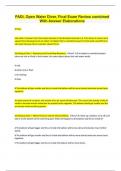
-
PADI, Open Water Diver, Final Exam Review combined With Answer Elaborations
- Exam (elaborations) • 27 pages • 2024
-
- $15.49
- + learn more
PADI, Open Water Diver, Final Exam Review combined With Answer Elaborations D float. Salt water is heavier than fresh water because it has dissolved minerals in it. This means it causes more upward force (buoyancy) on an object. An object that is neutrally buoyant in fresh water would float in salt water because there is greater upward force. See Being a Diver I - Buoyancy and Controlling Buoyancy. Ans 1) If an object is neutrally buoyant (does not sink or float) in fresh water, the same ...
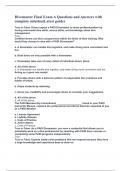
-
Divemaster Final Exam A Questions and Answers with complete solution(Latest guide)
- Exam (elaborations) • 23 pages • 2024
-
- $13.99
- + learn more
Divemaster Final Exam A Questions and Answers with complete solution(Latest guide) True or False. Divers expect a PADI Divemaster to show professionalism by having role-model dive skills, rescue skills, and knowledge about dive management. True. Certified divers can dive unsupervised within the limits of their training. Why would they choose to dive with a PADI Divemaster? a. A divemaster can handle dive logistics, and make diving more convenient and fun. b. Boat dives are only possib...
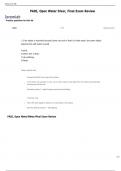
-
PADI, Open Water Diver, Final Exam Review Practice questions for this set Learn 1 / 7 Study with Learn 1) If an object is neutrally buoyant (does not sink or float) in fresh water, the same object placed into salt water would A sink. B either sink
- Exam (elaborations) • 15 pages • 2024
- Available in package deal
-
- $7.29
- + learn more
PADI, Open Water Diver, Final Exam Review Practice questions for this set Learn 1 / 7 Study with Learn 1) If an object is neutrally buoyant (does not sink or float) in fresh water, the same object placed into salt water would A sink. B either sink or float. C do nothing. D float. Choose matching term A become half the size it was at the surface. At 10 meters, the pressure is 2 bar. An air volume taken to this depth from the surface would decrease 1 and be...
Dive Guide Final Exam B
Dive Guide Final Exam B.
Dive Guide Final Exam B.
Dive Guide Final Exam B

Did you know that on average a seller on Stuvia earns $82 per month selling study resources? Hmm, hint, hint. Discover all about earning on Stuvia



